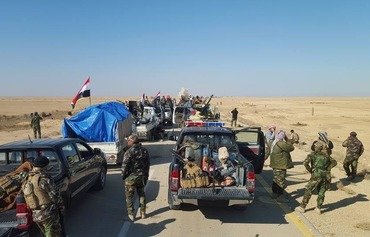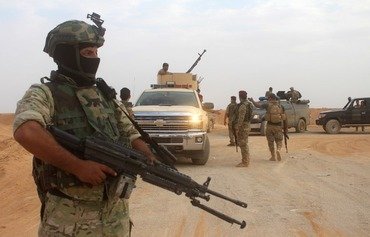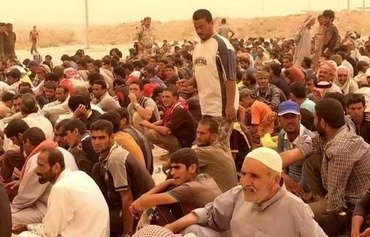Despite the dangers involved in fleeing parts of Anbar under the control of the "Islamic State of Iraq and Syria" (ISIS), many families feel it is worth the risk.
Among those who chose to chance an escape is al-Qaim resident Abu Mohammed -- using a pseudonym out of concern for his safety -- who fled from his hometown with his wife and brother.
Towards the end of July, Abu Mohammed said, he managed to deliver his family to the nearest Iraqi army checkpoint in the town of al-Rutba, after two days of walking in rugged terrain.
He told Diyaruna he used smugglers to help him navigate the route across the desert "for the price of $300 per person".
"This was expensive for us because we have no jobs, but we managed to find the money and save ourselves in spite of the danger," he said.
"When we risk our lives, this is clear proof of the hell we are in with terrorists," he added. "ISIS oppresses people [in al-Qaim], and if people do not die at the hands of the group’s members, they die because of lack of food and medicine."
Thousands flee border towns
Thousands of residents of the western Anbar border towns of al-Qaim, Anah and Rawa have been forced to flee their homes because of the tyranny of ISIS, which has taken control of the area and laid siege to its inhabitants.
"Over the last three months, around 20,000 residents have managed to escape the terrorists with the help of smugglers, despite the associated risk and the steep cost," said al-Rutba mayor Imad Meshaal al-Dulaimi.
"We have a special area to receive fleeing families where first aid and food is provided," he told Diyaruna. "Then, they are transported to a camp in western Ramadi so they can be sheltered and looked after."
By the time these internally displaced persons (IDPs) reach the security forces, they are in bad shape as they suffer from exhaustion and fear, al-Dulaimi said.
Many have tragic tales to tell about life under ISIS rule.
Some report they have been imprisoned, flogged and robbed of their possessions or homes, he said. Others say they have been trapped in their areas and prevented from leaving, even if they were suffering from hunger or illness.
"This horrible existence forces families to go on a dangerous and difficult journey to freedom, since taking the risk for them is more bearable than staying in that hell," al-Dulaimi said.
"When escaped families make it to safety, they tell us they cannot believe that they managed to escape," said Anbar provincial council member Athal al-Fahdawi, adding that it is "as if they have a new lease on life".
'No mercy in their hearts'
Before these people managed to escape, "they were under the control of people with no mercy in their hearts", al-Fahdawi told Diyaruna.
"People only had water, dates and dried bread to eat and were slowly dying," he said, adding that some who attempted to escape did not make it, "and ISIS executed them in the most horrendous way".
With the battle to drive ISIS from western Anbar imminent, al-Fahdawi said he expects more people to flee the area.
Local officials estimate ISIS has trapped around 60,000 civilians in these areas, which have become a sort of haven and last stand for the group after its defeat in Mosul.
As for the numbers of ISIS fighters, security expert Jassim Hanoun told Diyaruna "it is difficult to have precise numbers, since the areas they control are directly open to the desert and Syrian cities".
But estimates put the number at around 6,000, he said, some of whom took refuge in the Anbar desert after the battles to liberate Salaheddine and Ninawa.
"The suffering of trapped civilians is very painful, as the group treats them with cruelty and excessive violence," he said. "Those who were fooled have now come to realise the true nature of terrorists and their claims."

![Anbar province residents receive government assistance packages after escaping from areas controlled by the 'Islamic State of Iraq and Syria' in an image posted online on July 8th. [Photo from the Iraqi Ministry of Displacement and Migration's Facebook page]](/cnmi_di/images/2017/08/11/9117-iraq-mosul-aide-600_384.jpg)






